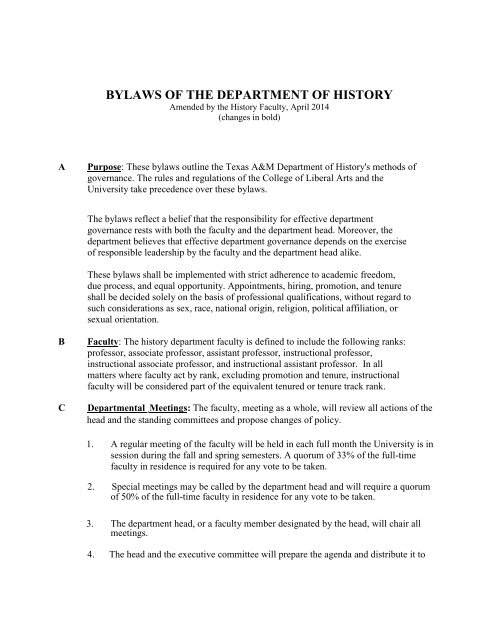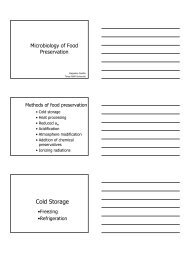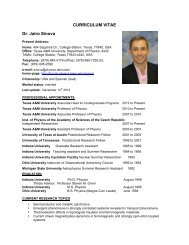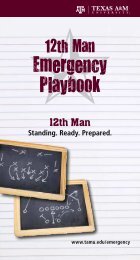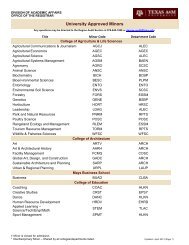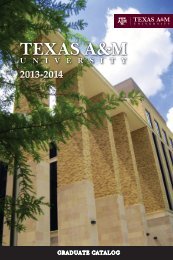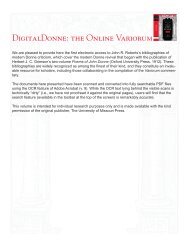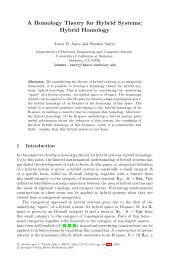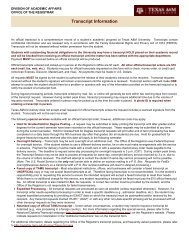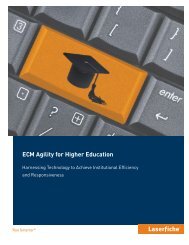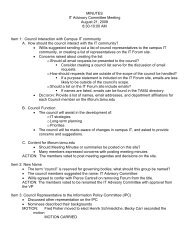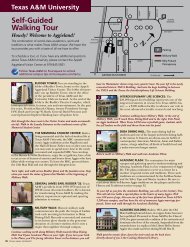BYLAWS OF THE DEPARTMENT OF HISTORY
BYLAWS OF THE DEPARTMENT OF HISTORY
BYLAWS OF THE DEPARTMENT OF HISTORY
- No tags were found...
Create successful ePaper yourself
Turn your PDF publications into a flip-book with our unique Google optimized e-Paper software.
<strong>BYLAWS</strong> <strong>OF</strong> <strong>THE</strong> <strong>DEPARTMENT</strong> <strong>OF</strong> <strong>HISTORY</strong>Amended by the History Faculty, April 2014(changes in bold)APurpose: These bylaws outline the Texas A&M Department of History's methods ofgovernance. The rules and regulations of the College of Liberal Arts and theUniversity take precedence over these bylaws.The bylaws reflect a belief that the responsibility for effective departmentgovernance rests with both the faculty and the department head. Moreover, thedepartment believes that effective department governance depends on the exerciseof responsible leadership by the faculty and the department head alike.These bylaws shall be implemented with strict adherence to academic freedom,due process, and equal opportunity. Appointments, hiring, promotion, and tenureshall be decided solely on the basis of professional qualifications, without regard tosuch considerations as sex, race, national origin, religion, political affiliation, orsexual orientation.BCFaculty: The history department faculty is defined to include the following ranks:professor, associate professor, assistant professor, instructional professor,instructional associate professor, and instructional assistant professor. In allmatters where faculty act by rank, excluding promotion and tenure, instructionalfaculty will be considered part of the equivalent tenured or tenure track rank.Departmental .Meetings: The faculty, meeting as a whole, will review all actions of thehead and the standing committees and propose changes of policy.1. A regular meeting of the faculty will be held in each full month the University is insession during the fall and spring semesters. A quorum of 33% of the full-timefaculty in residence is required for any vote to be taken.2. Special meetings may be called by the department head and will require a quorumof 50% of the full-time faculty in residence for any vote to be taken.3. The department head, or a faculty member designated by the head, will chair allmeetings.4. The head and the executive committee will prepare the agenda and distribute it to
the faculty at least one week prior to meetings. Any faculty member, by writtenrequest (including submissions via e-mail) to the head or executive committee,may place an item on the agenda.5. A secretary will be chosen each semester at the first regular meeting. Minutes ofall meetings will be distributed to the faculty within a week.6. In all cases not specifically covered by these bylaws, Roberts Rules of Order willbe used to conduct meetings. A copy should be available in the library.DDepartment Head: The head is the department's executive and is responsible to thefaculty, the dean of the college, and the university administration. The department headshall serve no more than two consecutive four-year terms. At the end of the first threeyears, the tenured and tenure-track faculty of the department will vote to continue or not tocontinue the Head for a second term. That vote, taken by secret ballot, will be tallied bythe executive committee and be sent as a departmental recommendation to the Dean.1. The head's major responsibilities include, but are not limited to:1.1 proposing long-range plans to the faculty and executive committee;1.2 assigning courses to individual faculty, following the established principleof course rotation;1.3 supervising and directing the staff;1.4 preparing the budget and other financial planning;1.5 recommending pay increases in consultation with the executivecommittee; and will inform each faculty member of : a) the basis on whichtheir raise, if any, was decided; b) whether it be solely on an annual review,or on their performance over multiple years of service; and c) the quartileranking evaluation received from the Executive Committee.1.6 appointing committees and departmental representatives and officers withthe advice of the executive committee, except as otherwise provided bythese bylaws;1.7 presiding over department meetings; and,1.8 serving as a conduit for communications between the faculty and theadministration.
2. In addition, the head will initiate reviews of faculty performance and makerecommendations to the dean on tenure and promotion. In fulfilling this function,the head will:2.1 justify salary and promotion decisions to the individual members of thedepartment in writing;2.2 meet with each tenure-track faculty member at least once during theacademic year to discuss that individual's research, teaching, and otherprofessional activities, and whether that person is making satisfactoryprogress.EStanding Committees: The following standing committees will assist the faculty andhead in administering the department. As needed, search and ad hoc committees willbe appointed by the head with the advice of the executive committee.1. Executive Committee: The executive committee will represent the faculty inadvising the head, who will serve as its chair. It will consist of six membersbesides the head and include at least one member from each faculty rank. Memberswill serve two-year terms and no one shall serve more than two consecutive terms.1.1 Conduct of elections: The executive committee will be elected in a secretballot by the faculty. Election of three members by rank and three membersat-large will take place in alternate years. An ad hoc election committeeappointed by the head will call for nominations. Voting faculty must securethe permission of those eligible faculty whom they wish to nominate andforward those names to the election committee. At least one week beforethe election, the election committee will distribute ballots containing thenames of all nominees. In elections by rank, faculty will vote for onecandidate from each rank; if a candidate fails to receive a majority of votescast in the first poll, a run-off will be held between the leading candidates.In elections at-large, faculty will vote for their three preferred candidates;the leading vote-getters without majorities will face a runoff until amajority is obtained. All tenured and tenure-track faculty are eligible tovote. Ballots will be distributed by e-mail and may be cast either by e-mailor the dual-envelope system.1.2 Filling Vacancies: In the event that a vacancy occurs on the ExecutiveCommittee a special election will be held at the earliest feasible moment.The election will be conducted according to Section D Paragraph 1.1. Thefaculty member elected will finish out the time remaining on the vacantseat.1.3 Functions: The Executive Committee will serve as a committee oncommittees and advise the head on all committee appointments, includingsearch committees, and on the appointment of departmental officers. it will
serve as a planning and priority committee and suggest to the facultythe direction the department should take in hiring new faculty, encouragingresearch, and improving instruction. It will conduct annual reviews offaculty and advise the head on the allocation of resources, includingproposed salaries. Ultimate authority in these matters will remain with thehead, but the head must inform the Executive Committee of actions takenconcerning these matters. In addition, the committee will undertake anyspecial tasks which are not within the purview of other standingcommittees and which may be assigned to it by either the faculty or head.Agenda and minutes of all executive committee meetings will bedistributed to the full faculty within a week.1.4 Consultation Between the Executive Committee and the Department Head:In general, discussion of appointments and other types of consultation withthe Department Head shall be done in a called meeting of the committee,but when this is not possible or preferable, discussion of appointmentsand other matters shall be done by emails addressed to the entirecommittee.1.5 The Executive Committee will meet at least once every full month ofthe Fall and Spring semesters in advance of the faculty meetings.2. Graduate Committee: The Graduate Committee will be appointed by the head withthe advice of the Executive Committee and will supervise graduate students andgraduate instruction. The director of graduate studies will serve as a chair of thecommittee, which will consist of seven members. The committee will work withthe director of graduate studies on the admission of students, the awarding offinancial assistance (including assistantships and fellowships), and thedistribution of graduate student research and travel funds. The committee willinclude a representative selected by the graduate students who will be a fullparticipant except in personnel discussions. The committee shall meet at leasttwice a semester.3. Undergraduate Committee: The Undergraduate Committee will be appointed bythe head with the advice of the Executive Committee and will superviseundergraduate history majors and undergraduate instruction in the department. Theassociate department head will chair the committee, which will consist of at leastfive members including one of the undergraduate advisors and a graduate student.The student will be a full participant except in personnel discussions.4. Social Committee: This committee will be appointed by the head with the adviceof the Executive Committee and will supervise all departmental social affairs andthe flower fund. It will consist of at least three members, including a graduatestudent. Members will serve two year terms, with approximately half appointedeach year.
5.5 There will be a secretary for each candidate for the mid-term review andfor promotion and tenure who will record the discussion during the meetingand modify the evaluation committee report as needed. The sameprocedure for selecting the chair will apply to selecting the secretary.5.6 Modifications of the evaluation committee report will be submitted tothe Promotion and Tenure Committee for approval.5.7 The department head will forward the full dossier and an explanation ofthe committee's recommendation to the dean. The head will also forwardan independent evaluation based on the candidates' dossier.5.8 In a tenure and promotion decision, the minority may submit a signedreport in writing to the department head, who will submit it to the fullPromotion and Tenure Committee. The majority may, if it wishes, respondin writing. The majority and minority reports and the majority's response,if any, must be submitted to the department head and included in thecandidate's dossier.5.9 Individuals in the titles of Instructional Assistant or Instructional AssociateProfessor may be considered for promotion to the rank above.Instructional Assistant or Associate Professor who are candidates forpromotion must submit a dossier for consideration by the departmentalpromotion and tenure committee, following the same procedures used fortenured and tenure-track faculty.6. Faculty Awards Committee: This committee will be appointed by the headwith the advice of the executive committee and will supervise the nominationprocess for faculty awards. It will consist of at least four members who willserve two year terms, with half appointed each year.7. History Prize Committee: This committee will consist of an undergraduateadvisor and faculty member appointed by the head with the advice of theexecutive committee and will supervise the awarding of departmental prizes toundergraduate majors.F. Department Officers: On both a continuing and an ad hoc basis specific functions ofthe department will be assigned to appointive officers. Such officers will be responsible tothe faculty and the head.1. Advised by the Executive Committee, the department head will appoint thefollowing officers for three year terms:
1.1 Director of Graduate Studies1.2 Associate Department Head and Director of Undergraduate Programs2. Advised by the Executive Committee, the department head will appoint thefollowing officers annually:2.1 Phi Alpha Theta Adviser2.2 History Club Adviser(s)2.3 United Way Coordinator2.4 Library Representative(s)As necessary, the Department Head, with the advice of the Executive Committee,will appoint faculty members to other offices.GHVoting Procedures: All elections, except those involving promotion and tenure shallbe conducted by e-mail with all faculty members being eligible to vote. The period forballoting shall be five calendar days with the option to cast a ballot by e-mail or thedouble-envelope system. Only faculty in residence may vote on hiring decisions and, byunanimous consent of those present at the meeting to discuss hiring, an offer can bemade immediately after the meeting.Amendment Process: These bylaws may be amended by the full faculty on therecommendation of one-third of the faculty or the executive committee. All proposedamendments will be presented and discussed in a faculty meeting prior to a vote by secretballot. The process of balloting will take no longer than a week and amendments will takeeffect if they receive the approval of a simple majority of those voting.


